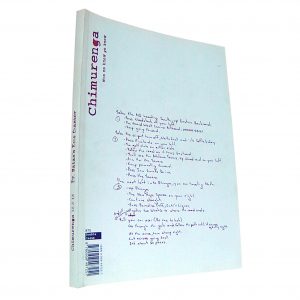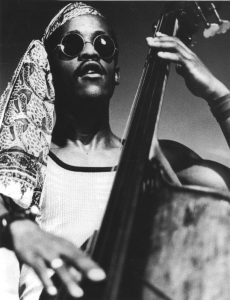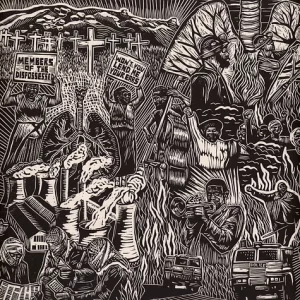Fela is dead and so is his anti-materialist political message. Modern Afropop is Brand Africa – all things young and aspirant. Enter P-Square and Nigeria looks set to reclaim poll position in African contemporary music. Olufemi Terry reports.
I confess: I had never heard of P-Square until this year. “Do me” was the first song I heard, infectious and easy to understand because it is sung in pidgin. The video was something Jodeci might have produced in the 1990s: hordes of women in a nightclub, mugging for the camera; Peter and Paul, the twin members of P-Square, styled in baggy t-shirts, crucifixes on long chains, a flat cap for one and a do-rag for the other. Their image is faintly macho, suggestive; more B-boy than Bubblegum R&B. The lyrics are nothing special:
This na the song for the dancehall/The way you move your body, e be like say/(E be like say) you no know say wahala dey/Na the way you do the things you do.”
To the undiscerning ear, it could be Kenyan or Ugandan or even Ghanaian. This is modern Afropop.
“Have you heard of P-Square,” I asked a friend who’d introduced me to D’Banj a few years ago. He laughed at me, kissing his teeth. More proof that I was an ajebota.
With respect to contemporary African music, one thing is not in dispute: Fela is dead and his heirs, Femi and Lagbaja, are skilled musicians, but they pale in comparison to the ancestor. The twins P-square are entertainers: talented, provincial boys made good. Watching their videos on YouTube, I am certain that they are re-establishing (in tandem with Nollywood) the cultural supremacy that Nigeria relinquished on Fela’s death.
The end of apartheid made South Africa the African continent’s musical and entertainment Mecca. Yet, while other Africans trained their eyes and ears on eGoli, Nigerians continued to fixate on the US, absorbing its influences and emulating its music. Of course, fuji was always there, and juju too. But ndombolo, makossa and later kizomba and kwaito never showed signs of catching on in Lagos.
At the same time, a musical vacuum developed on the continent. South Africa’s musical and cultural exports were slick and well-produced, but also too insular to gain continent-wide popularity. The kwaito sound was perhaps too derivative of house music to win favour with young Kenyans and Ghanaians. Soapies like Isidingo were too multicultural − they featured whites − and polyglot for young African audiences weaned on all-black American rap and film and not accustomed to the colonial landscapes of Southern Africa.
Big Brother Africa, by contrast, was a great success and made household names of twelve middle class kids from across the continent. The series’ strength was its melding of suspense and the contemporary culture of young, aspirational Africans – a mix that resonated in living rooms from Lilongwe to Accra. MTV Base Africa and Channel O came into being, eager to anoint the next pop superstar, and it was increasingly evident that South African music could not fill the void; Swahili/Sheng pop artists like Mr Nice and Nameless appealed to East and Central Africans, but not to those beyond.
A happy confluence of factors played a role in the rise of P-Square: Nollywood had begun beaming pidgin and Nigerian culture into homes across the continent; and two Afropop songs tore through the old divisions of lusophone/francophone/anglophone Africa and achieved popularity in Lagos: Magic System’s “Premier Gaou” and Awilo Longomba’s “Coupe Bibamba” (which featured, not coincidentally, Jocelyne Beroard who, as part of Kassav, served as midwife of a very specific brand of global dance pop). Thus, Nigeria became attuned to the rest of the continent (and the wider black diaspora) and began to take inspiration from it.
Today, Nigerian artists are moving away from reflexively regurgitating emulations of US hip hop and R&B and are mining influences and styles from across Africa, Latin America and Europe. The trend mirrors the victory of aspirational pop over political music. Although P-Square, 2face and Ikechukwu might not be able to out-America the Americans, African pop culture possesses global commercial appeal. Nowadays, even Beyonce claims to be influenced by Fela.
But if P-Square is channelling anyone, it’s not Fela, but Prince Nico Mbarga, who sold 13 million copies of Aki Special featuring the hit song “Sweet Mother” in the 1970s and 1980s. “Sweet Mother”, sung in pidgin and full of the sort of sweet guitar licks found in Central and East African music, was a paean to man’s first love: mother-love. Perhaps at the time of the song’s release in 1976, post-independence optimism was still high enough that the song was perceived as a tribute to the continent.
P-Square (and D’Banj) represent the defeat of Fela and the growing irrelevance, the disintegration of his ideas about a communal, anti-capitalist and anti-materialist pan-African entity. These have been replaced with another sort of pan-Africanism: one of shared consumerism, idolatry (Michael Essien, Akon) and even idiom (luv u 4 eva).
The revolution came and it lost. P-Square is where the continent’s at: young, avid and brand conscious. The group knows that a thuggish, hip hop image will not wash with Africans; we have proven too bourgified for revolution, too conformist for nihilism.
Rather, P-Square fits firmly in the tradition of R&B-ers, such as Bobby Brown, Guy and Usher, who have taken some cues from the hip hop world. It blurs masculinity with a sort of cookie-cutter, falsetto sensitivity and sings in pidgin about love, life and clubbing. Its sound and image are an astute blurring of global influences: soukous-inflected Afropop and Afrobeat; the auto-tuned sound of contemporary pop; the high-pitch of Michael Jackson and the saccharine verses of New Edition:
My angel, my one and only/The only one that I’m missing.”
The beats are reminiscent of dancehall; Spragga Benz and Vincentian artist, Kevin Lyttle, come to mind. It favours “Oh-Oh” choruses and calls.
The members of P-Square come across like the boys next door: playful, eager to please and humorous. And yet, like many other music phenomena, the act is disposable. The group’s momentum demands that it attempts to conquer the pop Mecca, the US, but this is a risky strategy – surrendering the base of loyal fans for a new and still more fickle audience.
P-Square has eclipsed Koffi Olomide on the continent, but it remains to be seen whether it can attain similar status in the US.





